Newsletter


Our Newsletter
Connections
Apr
21
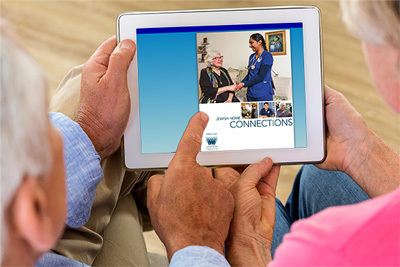
Enjoy the Latest Jewish Home Connections Online!
In the latest edition of Jewish Home Connections, the Home’s Chief Medical Officer Noah Marco shares how Los Angeles Jewish Home is implementing technological innovations to benefit our residents. This issue also includes an interview with Richard Ziman, the chair of the Jewish Home Foundation. Please enjoy reading more about the Jewish Home!
Click Here to Read
Apr
21
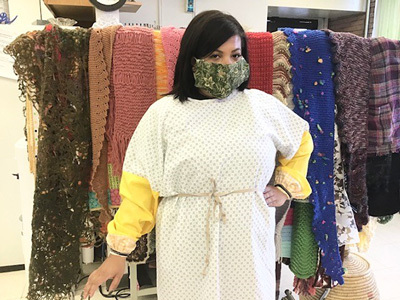
Do You Sew? Join Our Helping Hands Campaign!
For frontline healthcare workers, wearing a protective gown and masks is vital to preventing the spread of COVID-19.
A few weeks ago, staff at the Los Angeles Jewish Home began to realize that there was a shortage of disposable gowns. And, prices were skyrocketing. "We cannot pay sixteen, eighteen dollars for a disposable gown that before COVID cost 34 cents each," Molly Forrest, the Home's CEO and president recently explained to Forbes.
Kathleen Glass, executive director of the Home's Eisenberg Village campus, came up with a solution.
Inspired by her husband's suggestion, Glass and her colleagues began sewing long sleeves onto traditional hospital gowns. In one day, they were able to sew 40 gowns in the Arts and Crafts room at Eisenberg Village.
Now we're asking our friends and community members to join our "Helping Hands" campaign to create long-sleeve gowns. In addition, we still have a need for face masks.
To help with gowns, please contact our Volunteer Services Director Stacy Orbach at 818-774-3116, or [email protected]. Orbach will coordinate the gown distribution, as the gowns will need to be picked up from her by volunteers who are sewing on sleeves.
Masks can be delivered to Jeff Gall, Los Angeles Jewish Home, 7150 Tampa Ave., Reseda, CA 91335.
How to Sew Sleeves onto a Gown
Watch this YouTube video, with Glass narrating the instructions.
And here are the step-by-step instructions:
Assemble Sleeves First:
Align the long and short ends of the sleeve piece and pin into place.Sew long edge together to create a sleeve, inside out.Create a casing (tunnel) for the elastic around the wrist end by folding the material around the wrist 1/4 inch, fold again to create an approximately 1/2 inch channel for the elastic, pin in place.Sew along the top edge of the folded channel. Leave a 1/4 inch opening to insert the elastic band.Insert the elastic band, use a safety pin or other implement to push into the channelSew the ends of the elastic band together and sew the 1/4 opening closed.Now that the sleeve is put together, the last step is to sew the upper arm portion onto the opening of the gown short sleeve end.Turn sleeve right side outTurn gown inside outInsert sewn sleeve inside of inside out gown sleeve until the edges to connect align-pin togetherSew edges togetherPull sleeve right side out and the job is done!
Waist Tie Extensions
Align the long, thin piece of material with the already existing gown ties.Sew along the edges to create a gown tie extension. (2 waist tie extensions per gown)
Tip: Assembling/sewing the sleeves all at once may be helpful, then moving on to sewing them onto the short sleeves of the gown. If you need guidance or trouble shooting, please call Sandra Hess at 619-972-8188.
Apr
6

This Passover is Different and the Same
Ma Nishtana ha-Pesach hazeh? How is this Passover different? Coronavirus! What was unimaginable even a month ago seems clear now: Most people are not going to gather in person for Passover Seders. Many will use laptops and phones for virtual Seders, which could conjoin more people than usual. Perhaps families from across the country and even the world will unite virtually. Of course we worry about elders who are alone and may not have technological know-how. One of the great aspects of being a resident at the Los Angeles Jewish Home is that, even in a world of social distancing practices, no one is forgotten or alone here.
What lessons can Passover teach us about navigating through the world we are living in today with the coronavirus on the verge of surging in our country:
Washing hands is an ethical, Jewish act. Hand washing exists as a daily Jewish ritual that precedes saying the motzi blessing to start a meal. The blessing culminates with, "al netilat yadaim," which means "lift up the hands." We elevate ourselves before we eat, by symbolically lifting our hands up. But the Passover Seder is the one meal of the year when we wash our hands twice, once with and once without a blessing. Why? Water is life, and the water sanctifies our hands for mitzvot. You can have a heart of gold but it is the action you take with your hands that makes all the difference in the world. One person uses their hands to hoard paper goods. Another uses their hands to call a lonely person. We are living in a period when hand washing can slow down the viral spread and ultimately save lives. The more you wash, the better for everyone. And the more you use your hands for good and not greed, the prouder you will be of yourself when all of this is over.Memory, imagination and optimism are core to Jewish survival. The foundation of a Passover Seder is to imagine ourselves as if we were slaves in Egypt, so that we will remember the pain of the enslaved and be compassionate toward and activistic on behalf of anyone who is oppressed. But the Seder is a journey. At the beginning of the Seder we are slaves, but at the end we are free. As psychiatrist Victor Frankl points out in Man's Search for Meaning, people who thrive most during frightening and difficult times are those who can both remember sweet moments of the past and imagine a future of joy, purpose and meaning. We should already begin picturing life after Coronavirus. Write about it, talk about it, paint about it. Envision. Dream.We are one. After Egypt, the Jewish People could have concluded that the world is unkind and we should look out for ourselves. Instead what emerges is a Torah that instructs 36 times to love the stranger because we were strangers in the land of Egypt. In the era of Covid-19 there is no such thing as a stranger. We can draw borders and build walls. We can name our cities, states and countries. We can imagine those who look different from us or who speak a different language are separate from us. But the virus does not care about your language or accent, your skin color or your ethnicity. It does not see borders nor recognize your political orientation. The virus reminds us that we are one humanity and we are in this together.
When the bread couldn't rise we baked matzah. When the world was cruel to us we re-established the state of Israel. When there has been darkness in any form we have brought light, humor and hope. May your Passover be filled with elevation of hands and heart, with memory, imagination, connection, celebration, generosity, health, hope and love!
Apr
6

How to Host a Community Seder While Social Distancing
The Community Seder is not only a beloved tradition at the Los Angeles Jewish Home, it is embedded in our history.
The Jewish Home began when a small group of caring neighbors gave shelter to five homeless Jewish men on the first night of Passover in 1912. Those five seniors were the first residents of what would become the Los Angeles Jewish Home.
This year, because of the COVID-19 pandemic, Passover will be a different experience for our residents and their families. It will also contain some familiar elements.
"The food will be same. The symbolism will be the same. We are kashering the kitchens, so that's the same," says Rabbi Karen Bender, the Home's Skirball Director of Spiritual Life. "What's different will be how we get everyone to have their own Seder experience."
In order for everyone to have a Seder experience, Rabbi Bender says that the Home has purchased 1,000 individual Seder plates, perhaps she adds, setting a world record. "Everyone will get their own," she explains. And there will be a few substitutes. Instead of a roasted hard-boiled egg (Beitzah), each resident will receive a hard-boiled egg that they can eat, as well as salt water for their parsley.
For those keeping score, 1,000 individual Seder plates means that there also needs to be 1,000 sprigs of bitter herbs, dabs of haroset, pieces of lettuce and containers of salt water. And, of course, 1,000 matzahs.
"But overall," says Rabbi Bender, "the Seder will be the same, but more personal, more tangible for our residents."
Because the Jewish Home is taking the necessary precautions to make our residents safe, we are not able to invite families onto campus this year. However, many of our members will share a Passover Seder using virtual technologies.
At Fountainview at Gonda Westside, staff will distribute Seder plates. Haggadahs and either wine or grape juice to those who have requested these items. Seders will be led via Zoom, and members are being asked to participate and read portions of the Haggadah.
"Many of our members have also told us that they will be celebrating with their families in their rooms via Zoom," says Lorin Krone, the executive chef at Fountainview at Gonda Westside.
Staff at Fountainview at Eisenberg Village are taking a similar approach, spending time with residents to install Zoom on their computers and phones so they can see their families over Passover.
They are also hosting a teleconference Seder, inviting their members to read portions of the Haggadah. "Our goal is to make the Seder interactive and festive," says Lauri Kamiel, the activities coordinator at Fountainview at Eisenberg Village. "We ordered balloons to decorate the hallways to replace the flowers and other decorations that we normally have in the community dining room during the Seder dinner."
Rabbi Bender and Eisenberg Village Rabbi Ron Goldberg will also use technology.
This year for the first time, Rabbi Bender will broadcast the Seder to all the residents at Grancell Village via closed circuit television.
"We want to make sure that, even though we are physically distancing ourselves this year, no one will be without community," she says.
At Eisenberg Village, Rabbi Ron Goldberg says that no matter how the residents participate in the Seder—whether via teleconference, Zoom or closed-circuit television—his goal is to instill hope. "Passover is the holiday everyone remembers because it's participatory," he says. "I want to show how, even though this is a trying time, we can come together for Seder. We may be isolated from each other right now, but we are not alone."
Apr
1
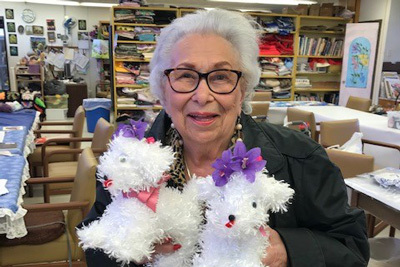
“This Shall Pass:” Jewish Home Seniors Share Their Wellness Wisdom
Many of us feel challenged by the current stay-at-home orders, including our socially isolated residents. To protect their health, our staff are delivering meals to our residents' rooms, finding creative ways to keep them active and doing their best to accommodate their emotional and physical needs as they shelter in place.Overall, however, our residents are resilient people. Some are Holocaust survivors, while others have struggled and overcome other personal hardships. Ask a resident how they're doing while under social isolation, and they'll tell you that while it's difficult, they understand it's necessary for their own good, as well as the greater good. They are making the best of the situation.
"This shall pass," advises Edith Frankie, a survivor of the Nazi concentration camps. "People don't like restrictions. Me? I'm used to it. Staying in our rooms is not so hard in comparison."Frankie lives on the Home's Grancell Village campus at the Joyce Eisenberg-Keefer Medical Center. She keeps her hands busy by crocheting. She keeps her mind busy by playing word games organized by the activities staff."People who feel isolated should do some exercises," she says. "I have been working out three times a week in our fitness center. The staff know what they're doing. I feel so much better after doing exercises for a half an hour.""They are doing a fantastic job here trying to keep us upbeat," says Leslie Scales, who lives at Eisenberg Village. "We miss our families. But there's not much else we can do. We are safe and healthy and that's all that matters."Scales looks forward to playing the daily "Dial-A-Bingo" games and receiving her lunch in her room. "The dietary staff are phenomenal," she says.
Meanwhile, Michal Robins, who also lives at Eisenberg Village, limits her TV-watching to once a day. The behavior therapist spends her time listening to music and writing a book for fellow therapists.And, as president of the resident council, Robins finds herself in a leadership role during the pandemic. "I'm teaching others to be positive. People are antsy being by themselves," she says. "But the staff here are doing a great job reminding us to practice good hygiene and to keep a safe distance."A Juilliard-trained musician, Robins is hopeful that she'll be able to return soon to leading the Oneg Shabbat concert and sing-a-long. "If we trust the experts, follow their instructions, and take our vitamins, we'll see better times. We hope for a miracle and push the days until we have a vaccine," she says.Resident Marilyne Holm, a former fashion designer, spent most of her time in the Eisenberg Village art room before the mandatory lockdown. While she misses the camaraderie of working in the art room, she is managing to stay productive, thanks to a Los Angeles Jewish Health staff member who delivers art supplies to her room.Holm is known for creating Mendels (little stuffed dogs wearing yarmulkes), which she sells to the public. She's been continuing to sew them, as well as teddy bears, in her room. "I'll have a whole kennel once lockdown is done," she says.Like her fellow residents, Holm understands that socially isolating is necessary. "I know this has to be done," she says. "Thank God I'm here at the Home, where I'm safe."
Mar
31
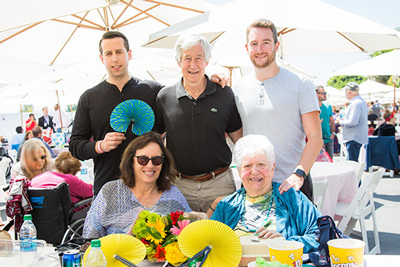
A Special Mother’s Day Celebration
The Los Angeles Jewish Home treasures all the beloved mothers, grandmothers and great-grandmothers in our care. Their safety and well-being is our top priority. As always, the Home wants these women to have a special and meaningful Mother's Day celebration.
This year, in response to the COVID-19 pandemic, the traditional World's Largest Mother's Day Celebration will be for residents only. As part of the celebration, the women at the Home will receive a gift, special meal and a nice day to show our love and appreciation!
If you wish to pay tribute and honor your mothers, grandmothers and great-grandmothers, the Home will create and produce a digital tribute journal that will include tributes and special messages. The digital tribute journal will be distributed via email to over 15,000 people so the entire community can celebrate our mothers, grandmothers and great-grandmothers. We will also have copies available on a USB device so all of our residents can view it.
If you wish to place a special message in our tribute journal, please send an e-mail to [email protected] or call Denise Horowitz at 818-774-3324.
Mar
31
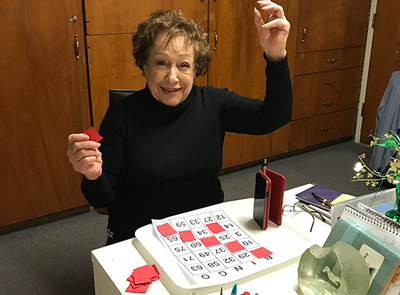
Serving the Needs of Our Residents, from Shabbat to Bingo
At the Los Angeles Jewish Home, our residents are accustomed to enjoying a wide range of engaging activities on a daily basis. Shabbat services, sing-a-longs and games of Bingo, are all integral parts of the Jewish Home experience.
Now with social distancing in place to slow the spread of COVID-19 (Coronavirus), our staff are coming up with creative ways to engage with our residents to help combat the feelings of isolation.
To "pierce that isolation" and serve the spiritual needs of our residents, Rabbi Karen Bender, the Home's Skirball Director of Spiritual Life, teamed up with Eisenberg Village's Rabbi Ron Goldberg to bring Shabbat services directly to the residents (while keeping a safe six-foot distance apart).
Rabbi Bender led what she calls a "Shabbat serenade" through the hallways at both Joyce Eisenberg-Keefer Medical Center (JEKMC) and the Mark Taper Skilled Nursing Building on Grancell Village. With guitar in hand, Bender appeared on every floor and at the entrance of every room, singing Shabbat songs and wishing residents "Shabbat Shalom!"
"People laughed and smiled and clapped along to the music," Bender said. It took her nearly two hours, but she wanted each resident to know that despite the mandate to remain isolated, none of them is forgotten.
Rabbi Goldberg toured the hallways at Eisenberg Village, accompanied by Volunteer Services Director Stacy Orbach and Lifestyle and Enrichment Director Annette Weinberg, singing songs. "Residents opened their doors as they heard the music," Orbach said. "We sang together, we danced together and we cried together (of course exercising social distancing). I witnessed joy, happiness and gratitude from our residents like never before."
And at Fountainview at Eisenberg Village, Activities Coordinator Lauri Kamiel and Lifestyle and Enrichment Director Carolyn Clark took their "Welcoming Shabbat" show "on the road" to their residents. "From their doorways, we sang Shabbat songs, and said the blessings for the candles, wine and Challah," Kamiel said.
Earlier in the week, Kamiel and Clark toured the hallways with a cart full of board games. They knocked on residents doors and shared some jokes and songs. The duo agreed that one of the highlights came when everyone sang "Tomorrow," from the musical "Annie." "Many residents are familiar with this song and joined us in an uplifting, feel-good moment," Kamiel said.
Staying in Touch
While the Home's Brandman Centers for Senior Care (BCSC), recently closed its day center, in compliance with guidance from California and the City of Los Angeles, the BCSC Clinic and Therapy services will continue to remain open to meet essential healthcare needs.
In the meantime, even though most of the participants, who reside in the local community, are not physically in the BCSC Day Center, BCSC staff are doing everything they can to keep them healthy and well. Staff are calling to check in with participants, sending health care providers out into the community, delivering both meals and supplies to those who need them, and sending care packages to keep participants engaged.
Dial-A-Bingo
If you've spent time at the Eisenberg Village campus, then you know how passionate residents are about their Bingo games. To help fill that void, Weinberg, came up with a solution: Dial-A-Bingo.
Weinberg distributed a flyer detailing the rules with a phone number for interested residents to use if they wanted to play. Then she handed out Bingo cards and colored paper squares to cover the called numbers. Weinberg, along with Orbach and Sandy Schipper, Lifestyle and Enrichment Assistant, phoned the residents and connected them into a conference call. They called the out the numbers, told jokes and kept track of the winners.
"All the residents who have played say it's a lot of fun," according to Weinberg. "They appreciate the effort. Residents are having so much fun that the word is getting out and more and more want to play. We plan to offer this daily during the week."
For resident Audrey Barger, who in normal times, volunteers as one of the Bingo callers on the EV campus, the activity is a welcome break from the daily routine. "Everybody looks forward to Dial-A-Bingo," she says. "It's a great way for us to connect with each other."
Putting Out the Word
To brighten the hours of our residents' days, we've put out the word that they would love to receive cards, pictures or letters! And, families have already responded to the call. If you would like to join the effort, please direct your cards and letters to our Director of Volunteer Services, Stacy Orbach, at our Eisenberg Village Campus at 18855 Victory Blvd, Reseda, CA 91335.
Mar
31
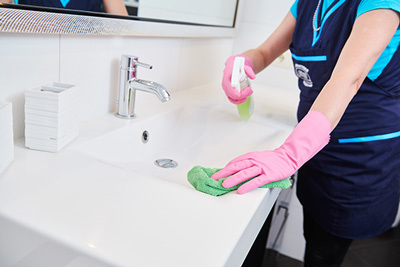
Develop a Household Plan to Face COVID-19
Here at the Jewish Home, the safety and health of our community remains one of our greatest priorities.
Below is guidance we received from the Centers for Disease Control and Prevention (CDC) on what you can do to safeguard your home against Novel Coronavirus, otherwise known as COVID-19.
Stay informed about the local COVID-19 situation. Get up-to-date information about local COVID-19 activity.Stay home if you are sick. Stay home if you have COVID-19 symptoms. If a member of your household is sick, stay home from work and school to avoid spreading COVID-19 to others. If your children are in the care of others, urge caregivers to watch for COVID-19 symptoms.Continue practicing everyday preventive actions. Cover coughs and sneezes with a tissue and wash your hands often with soap and water for at least 20 seconds. If soap and water are not available, use a hand sanitizer that contains 60% alcohol. Clean frequently touched surfaces and objects daily using a regular household detergent and water.Prepare a separate room and bathroom for sick household members (if possible). Avoid sharing personal items like food and drinks. Provide your sick household member with clean disposable facemasks to wear at home, if available, to help prevent spreading COVID-19 to others. Clean the sick room and bathroom, as needed, to avoid unnecessary contact with the sick person.If surfaces are dirty, they should be cleaned using a detergent and water prior to disinfection. For disinfection, a list of products with EPA-approved emerging viral pathogens claims, maintained by the Center for Biocide Chemistries, is available here and here. Always follow the manufacturer's instructions for all cleaning and disinfection products.Always read warning and ingredient labels on cleaning and disinfecting products and remember … NEVER MIX CLEANING PRODUCTS!Stay in touch with others by phone or email. If you live alone and become sick during a COVID-19 outbreak, you may need help. If you have a chronic medical condition and live alone, ask family, friends, and health care providers to check on you during an outbreak. Stay in touch with family and friends with chronic medical conditions.Take care of the emotional health of your household members. Outbreaks can be stressful for adults and children. Children respond differently to stressful situations than adults. Talk with your children about the outbreak, try to stay calm, and reassure them that they are safe.
Mar
17
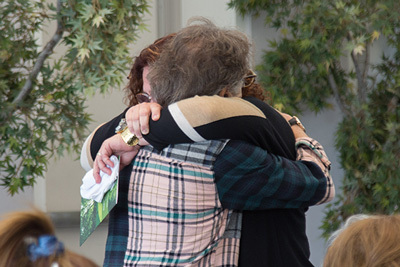
Skirball Hospice Service a Bridge from Memory to Blessing
In the days and months after their patients pass away, the Jewish Home's Skirball Hospice remains in the lives of their patients' families and loved ones. They offer bereavement support in the form of one-on-one counseling, personal letters and phone calls.
Since 2014, Skirball Hospice has hosted a memorial service to honor the memory of the patients in their care who have passed away throughout the year.
"Families and loved ones can often feel alone because they think no one else is feeling what they're feeling," says Ashley Teal, executive director of Skirball Hospice. "The memorial service provides people with an opportunity to sit and grieve together—to be with people who understand that their worlds have changed and reflect on that."
This year's service was held in March at the Skirball Cultural Center.
Bereavement Coordinator Alice Lynn, who organized the service, introduced the program: "Today, we gather as a community comprised of families, friends and Hospice team members. Today we celebrate those who have passed. We remember the love, laughter and priceless memories you may have shared."
During the program, Skirball staff and volunteers lit candles, performed music and shared readings. A moving ritual of building a matzevah, or altar of stones, to represent the individuals being remembered was also part of the program. As each patient's name was read, a stone was placed in their memory. Family members and loved ones were then encouraged to share their stories and memories.
For Mitzi Schwarz, the memorial service was especially poignant.
Schwarz is one of Skirball Hospice's spiritual counselors. She works with patients and their families "bearing witness," she says, to what they are going through during the end-of-life stage. In this capacity, Schwarz had attended and performed at three Skirball memorial services. However this year, she was grieving her own father, who had been a Skirball patient.
"It was a blessing for me," Schwarz says of her father's time as a Skirball patient. "To be supported by the Skirball Hospice team felt like I was being supported by my family. No one was a stranger."
At the memorial, Schwarz says she felt comforted by being in the presence of her fellow mourners. "I was able to just let my emotions flow," she recalls. "Being with other families whom I had helped throughout the year deepened the experience."
For more information on the Skirball Hospice program, please call 818-774-3040 or visit skirballhospice.org.